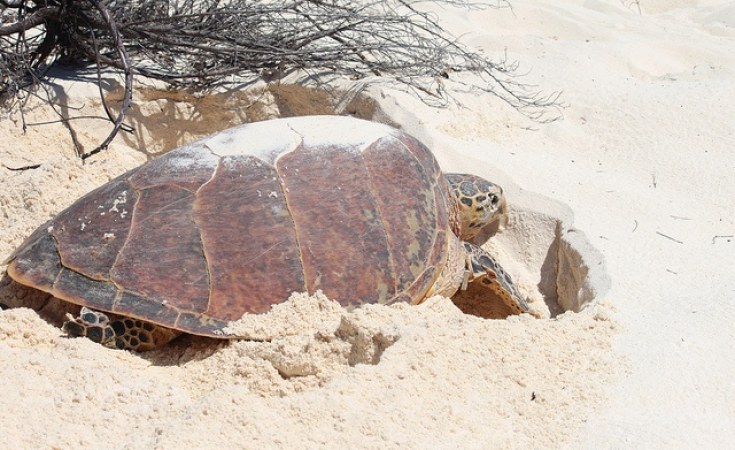There are over 40 turtles at the centre, brought in by various people who rescued them. Some of them injured and traumatised.
Two turtles rescued last month from a roadside trader in Akwa Ibom State, Nigeria's South-south have found a safe home in a conservation centre in Uyo.
Enim Akwa, a pilot in Akwa Ibom, bought the turtles off the trader who stood by the roadside, along a highway, seeking buyers.
The poor animals would have probably become meat in a family soup pot somewhere, if not for Mr Akwa's intervention.
Animals from the wild, otherwise called bushmeat, are considered a rich source of protein for many Nigerian families.
Over 70% of urban Nigerians have consumed bushmeat at some point in their lives, according to a research conducted in 2020 by Wildaid, an organisation that is working to reduce global consumption of wildlife.
Mr Akwa, accompanied by his wife, Enwongo, took the rescued turtles to the Biodiversity Preservation Centre, Uyo, and handed them over to Edem Eniang, a professor of wildlife and head of the centre.
"I truly admire Enim, and the way he is firmly rooted where wildlife and the environment is concerned. He walks the talk, truly," Mrs Enwongo said of her husband in a Facebook post.
Mr Akwa had a similar "turtle rescue mission" about two years ago, the wife said.
Turtle trade point
There are over 40 turtles at the Biodiversity Preservation Centre, brought in by various people who rescued them, according to Mr Eniang. Some of them injured and traumatised.
One of the turtles brought to the centre by Mr Akwa had a cracked shell. It would be evaluated and helped to get healed before it would be eventually released into the wild with the others, Mr Eniang said.
The locals usually hunt for the turtles around the swamps close to the Atlantic Oceans.
Besides, Mr Eniang said several others are brought into Akwa Ibom from the neighbouring Cross River State, where people are scared to sell them openly because the rangers at the National Park in the state are empowered to arrest and prosecute anyone caught trading in wildlife.
The spot along the highway where Mr Akwa bought the turtles has been known as a turtle trade point in Akwa Ibom, according to Mr Eniang.
"Most times one passes there you'll see them hanging them upside down for sale," he said.
"So, Inim (Akwa) is in the habit of, if he sees them when he is coming back from work, he will take them from those people and bring them for rehabilitation and release into the forest.
"I am really amazed at his interest in the preservation of that species," the professor added.
The turtles Mr Akwa rescued are called terrapin, found mostly in fresh water. Mr Eniang said they are endangered species, and should, therefore, not be hunted, eaten, or traded.
"The Convention on International Trade in Endangered Species of Wild Fauna and Flora (CITES) prohibits the trade on this species. CITES is domiciled in Nigeria at the Federal Ministry of Environment," Mr Eniang said.
"Number two, the Convention of Biological Diversity which Nigeria is also signatory forbids us from trading on them.
"But most importantly, the Nigeria Endangered Species Act also forbids, likewise the National Park Act of Nigeria, the trade on this species."
The challenge
Mr Akwa said his love for conservation began right from when he was a little boy because of the way his dad brought him up in Lagos, Nigeria's commercial capital.
"If you catch a bird, for example, my dad will just watch you. He will ask you what's this bird for. And you say 'Oh, I want to keep it'. He'll say no problem, can you feed it? And when you say yes, he'll say let's see. And if you are not feeding it, by the time you come back from school, he would have released the bird to fly away.
"He inculcated it into our heads that you have to take care of nature," he said.
Mr Akwa said when he got into secondary school, he joined conservation organisations which helped to increase his knowledge and love for conservation.
Challenge
But the snag here is that the people who hunt down turtles and other wildlife in Akwa Ibom, and other parts of Nigeria, may never stop it unless they understand the importance of conservation and practice it too.
Mr Eniang succinctly captured this challenge when he said to PREMIUM TIMES in a previous report: "But how can you plant conservation etiquette in a mind that is hungry?
"There's so much hunger in the land, there's so much challenge for survival. So, nobody will listen to you except you give them an alternative. We need to build that into the conservation plan."
"Funny enough, on my way back again today I saw one (turtle) again. I paid for it. I will take it to the professor," said Mr Akwa, who narrated to PREMIUM TIMES how he tried to enlighten the woman on why she should not be trading on the poor animal.
"Today's own, they wanted me to pay N5,000, but I ended up paying N3,000 for it," he said.


